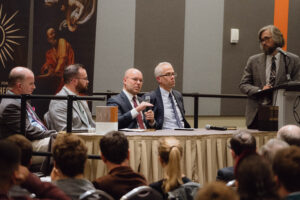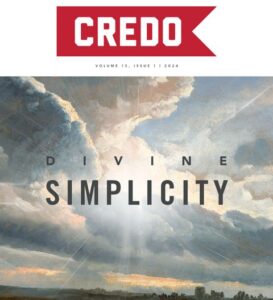The doctrine of divine simplicity has potentially elicited more attention, both positive and negative, than any of the divine attributes. Conversations about simplicity frequently shift to a wide array of theological topics, including the Trinity, other classical attributes such as immutability, or the relationship between God’s being and God’s knowledge or will. James Dolezal, author of All That is In God: Evangelical Theology and the Challenge of Classical Christian Theism, helps us untangle this theological web in the following interview with Credo’s executive editor, Timothy Gatewood. James has written two books on the doctrine of divine simplicity, such as his book God without Parts, and is one of the most qualified contemporary voices on the matter. In this conversation, James addresses the metaphysical claims surrounding divine simplicity while also examining the exegetical arguments and practical application for the doctrine.
The technical aspect of doctrines can sometimes prove difficult for students, so perhaps you can help us with some preliminary definitions. Divine simplicity teaches us that God is not made up of parts. What, exactly, constitutes a “part”? Is a “part” different than a “property” or an “attribute”?
A part is anything in an entity that is less than the whole and without which the entity would be somehow different than it is. A whole depends upon its parts for some features of its being but is not identical with any one of its parts. In short, parts fund some aspect of the whole’s being. It could also be said in some respect that parts depend upon the entity in which they are integrated insofar as the nature of the entity confers some actuality upon the part. The dependency relationship between parts and wholes can move in both directions, albeit in different ways. If God were composed of parts, he would depend upon something not himself to be himself. And this is not fitting for the one who is the first cause of all things.
As for properties and attributes, they are simply characteristics of a thing and may or may not function as parts. In God-talk they are just the names we call God without committing ourselves to the view that the conceptual distinctions in our God-talk are meant to pick out real distinctions or bits in God himself.
God’s absolute attributes are simply himself. His relative attributes are names given to him in virtue of some creature’s relation to him. Yet, even these relative names find a foundation in God’s absolute being, such as the name Creator.
Divine simplicity is often seen as one of the most academic theological concepts. Before we address some technical questions, let’s start with our general pastoral motivation. What is the practical value of divine simplicity for the people in the pew? What is lost if we or our congregations ignore the doctrine?
Christians believe that God is most absolute and utterly irreducible in being. There is nothing more fundamental than God—the one from whom, through whom, and to whom are all things (Rom. 11:36). Divine simplicity aims to support that basic Christian conviction by denying that God is reducible to parts upon which he depends for his being. Practically, it means the believer can depend upon God and trust him without reservation or qualification. God won’t fall apart on us because there are no parts for him to fall into. While the conviction of divine absoluteness can be maintained without any formal or explicit knowledge of the doctrine of divine simplicity, disregard for the doctrine makes it much easier to compromise that basic conviction by conceiving God as if he depended on principles of being more basic than himself. This erodes the Christian’s confidence in God.
Some contemporary theologians believe that it is possible to affirm divine simplicity while distinguishing the divine attributes from one another. In other words, they claim to affirm divine simplicity but reject what is known as the identity account – a term which you can, no doubt, help us understand. Does a belief in divine simplicity necessitate the identity account, or do these contemporary theologians offer a valid model for evangelicals today?
We should first distinguish between a conceptual distinction between divine attributes, which is valid, and a real distinction, which should be denied. A conceptual distinction derives from the different senses or meanings that belong to the various terms we use for God insomuch as they are drawn from our experience of creatures. Good doesn’t mean wise, and wise doesn’t mean just, and just doesn’t mean powerful, and so forth. A real distinction would go further and say that the conceptual distinctions between the terms of our God-talk correspond to really distinct ontic units or properties in God. It is true that the conceptual distinctions in our creature-talk often correspond to real metaphysical distinctions in creatures themselves, but this is not because conceptual distinctions necessarily prove or ground real distinctions.
The identity account of simplicity claims that in God all his attributes are really identical with the divine nature and with each other. This is not the same as denying all real distinctions in God, as is sometimes charged against those who hold the identity account of God’s attributes. Trinitarian adherents to divine simplicity, for instance, insist that the divine persons, though really identical with the divine nature, are really distinct from each other. The ground of this real distinction of the divine persons in God is the relations of origin rooted in the processions (generation of the Son from the Father, and procession of the Spirit from the Father and Son). There is no basis for affirming a real distinction in God unless that distinction is grounded in something that ensures its being real, and whatever grounds the alterity (or ‘opposition’ between the persons) cannot be an accident (that is, a form of being really distinct from a substance that exists by inherence in the substance). Relations of origin grounded on processions is the only thing that meets this demand since only relation is something real that does not necessarily have to be a substance (that which primarily exists in itself and not in another) or an accident.
God’s absolute attributes are simply himself. Click To Tweet There is a burden of proof on those who contend that real distinctions among divine persons warrants adherence to a real distinction among divine attributes, and that burden is to identify a ground in God for that distinction. So far as I can tell, this burden is not met by critics of the identity account. Moreover, it is an objectionable move to hold that the conceptual distinctions we make between the attributes grounds a real distinction in God. That appears to ground reality on thought rather than thought on reality.
As for divine simplicity requiring the identity account, I suppose it depends on what one’s reason is for holding to divine simplicity. If it is merely to affirm an original harmony and integrity within God—a primeval non-contrariety, so to speak—then the identity account would not be necessary. If it is to maintain the absolute irreducibility and primacy of the Godhead, then it would seem to be necessary to ruling out accidental distinctions within God (which would require act/potency composition), noting, of course, that distinctions based on relations of origin alone establish non-substantial real alterity in God without introducing accidents into the Godhead.
As a follow-up, is there a great deal of variety within the “Great Tradition” concerning the doctrine of divine simplicity? How strict must we be in our definition of simplicity in order to affirm classical theism? How big is the tent?
As for the basic rationale underlying divine simplicity, I would say there is not a great deal of variety in the classical tradition. All seem to agree that a God composed of parts would not meet the requirement that the first cause of all things be irreducible to principles more basic than himself. Nevertheless, there is some variety on the question of what counts as a part. For example, Basil of Caesarea and his brother Gregory of Nyssa seem to hold that there are really distinct propria in the divine nature that are not necessarily relations. Yet, as Andrew Radde-Gallwitz points out in his monograph on the Cappadocians’ doctrine of simplicity, their position on distinct propria in God seems not to have passed into the mainstream of the Christian tradition. It would not be accurate to present their view as a traditionally accepted version of God’s simplicity; it is more of a bug and an outlier than a major alternative option with continuous historic support. The same might also be said for the essence-energies distinction of Gregory Palamas, though his position has garnered several adherents and defenders, mostly within Eastern Orthodoxy.
Our doctrine of simplicity should be strict enough to decisively rule out any reduction of God to principles of being more basic than himself. It must be able to maintain that all that is in God is God. In my judgement, the surest way to achieve this is to maintain something like Thomas Aquinas’s doctrine of God as pure act, as subsistent being itself. While Thomas’s existential emphasis upon God as identical with his own esse (“to be”; actus essendi) transcends the essentialism of many of his forebears, it is not for that reason discontinuous with their expressions of the doctrine. Development is not necessarily discontinuity.
Richard Muller has described divine simplicity as among the “normative assumptions of theology from the time of the church fathers, to the age of the great medieval scholastic systems, to the era of Reformation and post-Reformation theology . . . ” Yet, 20th century theologians were seemingly quite comfortable to modify, ignore, or reject the doctrine entirely. Assuming Muller’s claim is accurate, what caused such a massive shift in our “normative assumptions of theology”?
While a truly adequate answer is beyond what my ability or space-allotment allow, it must be said that part of the answer lies in the eclipse of classical metaphysics. Aristotle, for instance, had quite a sophisticated account of causality and distinguished at least four causes: final, formal, efficient, and material. Once modern physics reduced causality to efficient causes—bits pushing and pulling other bits producing a dizzying array of material objects and events in a lawlike fashion—there seemed to be no meaningful explanatory role left for the other sorts of causes, especially final and formal. Formal causes had once been conceived as parts that supplied quiddity (substantial or accidental “whatness”) to composite entities. Their disappearance has made it harder for theologians living in the aftermath of the scientific revolution to identify them as parts and to make their denial appear theologically meaningful. If simplicity denies that God is caused by principles or parts, it becomes harder to maintain when theologians lose sight of what constitutes a part or a causal principle.
While folks tend to have a lot of questions concerning simplicity, I see that the “omnis” often provide a stumbling block for skeptics (“omnis” referring here to omniscience, omnipotence, and omnipresence). How does divine simplicity relate to God’s will and providence? If God is His action, does this mean divine simplicity reduces God’s freedom?
In the same chapter that states God is without parts, the Westminster Confession of Faith says that God is “most free” and “most absolute.” These are not at odds and in fact we could say God is most free because he is most absolute. If all that is in God is God—this being crucial to his absoluteness—then God’s will just is God’s willing. There is no real distinction in God between willer, willing, and willed. God is thus most free in that he is most for himself. He requires nothing that is not himself for the perfect enjoyment of himself. Far from reducing God’s freedom, this guarantees the absoluteness of it.
There is nothing more fundamental than God—the one from whom, through whom, and to whom are all things (Rom. 11:36). Click To Tweet As for God’s willing of non-divine things, we should say that he wills them with one and the same volitional act in which he wills himself. They are not ends distinct from God’s own self at which he aims (the end being the reason for the will). While such things are suppositionally necessary given that God immutably wills them to be (i.e., on the supposition that he wills them to be, they must necessarily be), they are metaphysically contingent since in them essence and existence are not identical and thus their existence is not naturally necessary to them. In this sense it is possible for them not to have been. And since God does not require such beings for the enjoyment of himself—the true good at which God’s one act of will aims—their existence does not appear to be naturally necessary to God. This undoubtedly leaves the exquisite difficulty of saying how God wills contingent creatures in the one act of willing himself. This has led many recent philosophers and theologians to reject the identity account of divine simplicity, or to dispense with the doctrine altogether.
Most Christians might recognize that the Bible teaches that the Lord, our God, is one (Deut. 6:4). Is this the extent of the biblical case for divine simplicity? Natural theology obviously plays a role in articulating the belief in simplicity, but to what extent does biblical exegesis support this doctrine?
The biblical case for divine simplicity derives most compellingly from passages teaching God’s absolute causal primacy over all that comes to be (e.g., John 1:3; Rom. 4:17; 11:36; 1 Cor. 8:6; 11:12; Col. 1:16; Heb. 2:10; Rev. 4:11). If God were composed of parts, he would be reducible to principles or causes more primitive (metaphysically, if not temporally) than himself. He would also depend on whatever supplied unity to those parts, the composer or principle that accounted for their togetherness. In short, he would not be the absolute first cause of being Scripture says he is. Of course, this interpretation does require that one possesses a general sense that parts relate to wholes as causes or sources of being somehow. One could also support the doctrine from all those passages in Scripture that support God’s aseity (e.g., Acts 17:24, 25, 28; Job 35:5–8; 41:11). A composite deity just could not be of himself, but rather derives from his parts as causes or principles of his being. This is more befitting the finite gods of the nations than the one who made all things to exist by the word of his power.
There is a lot of confusion surrounding the doctrine of divine simplicity, and I hesitate to identify any singular dilemma, but questions surrounding simplicity quickly seem to transition to the Trinity. How does divine simplicity avoid compromising the orthodox understanding of the Trinity – specifically, God in three persons?
Divine simplicity would only compromise the doctrine of the Trinity if it required that the persons, as such, be identical with each other. As noted in response to an earlier question, divine simplicity can cohere with the real distinction of persons in God so long as the ground of that distinction does not require God to be composed of parts. The ground must not introduce accidents into the divine being or result in a multiplication of primary substances. Relations of origin grounded on procession meets the requirement since the proper meaning or sense (ratio) of relation does not require inherence in a substance (and so is not necessarily an accident) and since relation is not a substance.
God requires nothing that is not himself for the perfect enjoyment of himself. Click To Tweet Orthodox Trinitarianism needs to say there are three who are God who are really distinct from each other without thereby multiplying substances or requiring accidents in God. The persons qua persons cannot be distinct substances or accidents. Relations of origin ensure a real distinction of persons in God without multiplying substances (so avoiding tritheism), reducing the persons to parts of God (this avoiding tripartitism), or introducing accidents into God (and so avoiding substance-accident composition in him). Simplicity naturally leads to the claim that the persons just are the relations—paternity, filiation, and spiration—subsisting. (In every being besides God real relations inhere rather than subsist.) If the persons were not identical with the relations that distinguish them, then it would seem the persons themselves would be composed of personhood plus a distinguishing relation.
Positively, divine simplicity rules out several unorthodox ways of understanding the one God who is three persons. It proscribes thinking of the three persons as three Gods, which would require either a material or accidental principle to establish their alterity and thus to be composed of parts (matter and form, or substance and accidents). It disallows any notion that the persons are parts of God, and so each less than truly God since parts must be inferior to wholes in some respect. If divine simplicity were not true, then polytheism would, in principle, not be impossible. This does not mean, of course, that one must grasp divine simplicity to sincerely reject polytheism, but a denial of simplicity opens the door for polytheism as a possible situation.
We’ve briefly mentioned natural theology in this interview. How dependent is divine simplicity on a particular metaphysical system? Must one be Aristotelian, for instance, to affirm the doctrine?
While Aristotle’s act-potency metaphysics has greatly aided theologians in articulating and elaborating the doctrine of simplicity, I would not say one must grasp Aristotelian metaphysics to adhere to this doctrine. All that is really needed is the theological belief that there is nothing more basic than God upon which God depends to be God and that wholes depend upon parts somehow more basic than themselves, and that God must therefore not be a composite of parts. That’s it. The rest is details.
How does divine simplicity “fit” within classical theism? In other words, can we still consistently affirm other divine attributes such as immutability, infinity, or eternality without divine simplicity?
It is indispensable to the proper maintenance of the other doctrines typically adhered to by classical theists. This does not mean one cannot hold to God’s immutability, say, without first articulating the doctrine of simplicity. Many have held to an unchangeable God who have never heard the claim that God is without parts. Yet it must be adhered to at least implicitly to guarantee immutability is not compromised. It is the absence of all passive potency in God that ensures he cannot receive further states of actuality, which is precisely what happens in all instances of mutation. An immutable God could not be composed of act and passive potency. A composite deity just could not be of himself, but rather derives from his parts as causes or principles of his being. Click To Tweet
What’s more, a God composed of parts could not be actually infinite since composition of parts is the very structure of finitude, one intrinsic part or principle delimiting another. For example, form restricts matter to be of a certain kind and not another and matter contracts form to be the form of this one and not that one. As for atemporal eternity, it is based on God’s immutability insomuch as time measures the movement of a thing from one state of being to another. There is not movement into new states of being in an immutable God. Such movement requires a principle of passive potency in a thing that is really distinct in it from the principle(s) of actuality. If simplicity were untrue, there would be no good reason to subscribe to those other tenets of classical theism.
Sometimes ancient or contemporary authors may refer to non-divine entities as simple, albeit in radically different ways. Thomas Aquinas, for instance, affirmed that angels were simple beings. How does divine simplicity differ from these creaturely examples of simplicity?
I would say with Thomas that angels are relatively simple beings and so also relatively infinite. This is because their substantial forms are not contracted by matter, angels being created pure spirits. They are not, however, absolutely simple or infinite, most importantly because they are composed of existence and essence. Each angel’s act of existence (esse) is contracted by its particular essence, thus rendering it finite. Put in biblical terms, no angel’s name is I AM. Angels are also composed of substance and accidents (e.g., they move about in space and are not omnipresent, they can undergo a change of will ,they can receive knowledge, and so forth). We should distinguish, then, between the relative simplicity of certain creatures and the absolute simplicity of God. This absoluteness consists most especially in the real identity of esse and essence in him. It is just God’s nature to be.
Image credit: Andrew Milligan sumo




